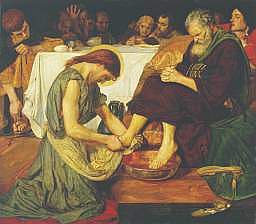I once worked in professional ministry.
There, I confessed. 😉
People paid me to show the light of Christ to others. And while I’ll add to the lament that the pay seemed to amount to little more than the change from a vending machine, it was pay nonetheless.
Where there’s one paid employee, there’s usually more. I worked in camping ministry for several years,  on staffs of about a dozen to almost three hundred—a half dozen staff experiences in all, split between mainline Protestant camps and Evangelical.
on staffs of about a dozen to almost three hundred—a half dozen staff experiences in all, split between mainline Protestant camps and Evangelical.
If I learned one truth during my tenure in professional ministry, it’s you can’t be a Christian organization and not have some kind of hierarchy of ministry focus. In my years as a paid Christian camping professional, I saw two different ministry focus hierarchies:
1. Our ministry focus is on God first, people who fall into our ministry objective second, and staff third.
2. Our ministry focus is on God first, staff second, and people who fall into our ministry objective third.
Let me tell you about the places I worked that employed that first hierarchy of ministry…
When you work at a Christian ministry that puts everyone else before staff, you discover that about halfway through your ministry objective timeline the well’s run dry. So much time has been spent pouring the life of the staff into the lives of the people they’re ministering to that in a few months time your staff’s inner lives resemble the Sahara Desert—during a drought. And with a plague of locusts, too.
Leaders of ministries who follow a staff third ministry model succeed in doing one thing exceptionally well: creating ministry burnouts.
The problem for leaders comes from always expecting staff to pour themselves out, while not lifting a finger to refill their earthen vessels. In the end, everything about the ministry fails. It may have started ministering by the Spirit, but when people dry up—and they will in this environment—they start ministering with the arm of flesh. And we all know what that means: failure.
One of the camps I worked for had a nationally-recognized name, multi-million dollar budget, and several hundred people going through its gates every week. But they also had a bizarre curfew on Sundays during the summer that made it nearly impossible for summer staff to make it to church and back under the curfew. As a result, a lot of staff had no chance to worship.
I worked on year-round staff. Because of some special skills I possessed, I transitioned from my regular duties into the summer duties and found myself bound by the curfew. My response? Start an in-camp worship service for staff on the one night of the week we all had free.
Seems reasonable enough.
But you’d be astonished at how much persecution came down on our worship—from the camp leaders! No, I wasn’t an ordained minister, but this was a Protestant camp right? Martin Luther, priesthood of all believers? And yes, we did offer communion, too. Or was that wrong, as well?
Honestly, I felt like the leader of an underground church right there in Evangelical land. But you know what? The folks who came to that worship service left filled. And those who begged off and complained stayed empty and later burned out.
The worship service persecution was just one of many ways that camp kept pouring out its staff and giving nothing back. The list went on and on. In fact, it could be the poster camp for how to grind up and spit out a staff.
And they LIVED for the staff third hierarchy. Practically engraved it on the walls of every cabin in the camp.
I worked at another Evangelical camp (see the trend?) that had strange rules in place, such as A-level staff couldn’t associate with B-level staff outside camp. I had no idea such a lamebrained rule existed until I told the camp director in passing that I was planning on taking the mildly-retarded camp janitor, who had no friends on staff that I could tell, out for an ice cream so he could get away from camp and talk with a real person. From the pummeling I received for merely attempting to minister to another staff person, you would’ve thought the whole idea was part of a scheme to murder the guy!
The sum of all the rules at that camp added up to a legalistic tangle of nonsense that proved…well, anti-human. In time, I feared I might be subjected to forty lashes minus one for ministering to the wrong person. Or the right person in the wrong place. Or the wrong way. At the wrong time, or—oh, the heck with it.
Conversely, the mainline camps I worked for—you know, liberals—went for the staff second approach. Their leadership perpetually worked to meet the spiritual, mental, physical, and social needs of the staff. They paid better. They threw special parties for staff. They celebrated milestones for everyone on staff, even the summer-only folks. They routinely asked each person on staff how his or her relationship with the Lord was going. They treated staff like real people and not underlings.
And they actually allowed staff to minister. To the visitors. To the other staff. To anyone.
Their success came from understanding that people cannot be perpetually poured out without something being poured back in. Yes, people can have a devotional life that provides some of that refreshing, but anyone in leadership knows that real leadership means giving something back.
Let’s be honest here. The amount of personal time we devote to interacting with the actual subjects of our ministry may pale compared with the amount of time we spend with other staff. Any wise person leading a ministry realizes that the lives most likely to be changed by the ministry are those who actually work for it. Yes, a ministry that works with the poor may very well touch the lives of the poor to whom they minister, but it’s far more likely that the ministry will forever change the staff that works in that ministry.
And I’ll go out on a limb and say that’s true for every single ministry on the face of this planet since the Day of Pentecost.
If you’re the leader of a ministry (doesn’t matter what kind), my charge to you is to lay down your life for your staff. Christ laid His down for the ones who follow Him. If your ministry model has been staff third, shred it—now. If you don’t, rather than building your staff, you might very well be creating burnouts who never darken the door of any ministry again. If you don’t believe me, I’ve got the e-mail addresses of a couple hundred ministry burnouts I can send you.
If you love the Lord, then love your staff. Show it in practical, tangible, life-changing ways. The Lord demonstrated that kind of love to His disciples, the ones He called friends. We can do no less for those people with whom we minister.

 He delayed His love for a friend to show an even greater love that proved His love not only for His friend, but to His Father.
He delayed His love for a friend to show an even greater love that proved His love not only for His friend, but to His Father. We consider the horror dumped on our laps and automatically assume
We consider the horror dumped on our laps and automatically assume